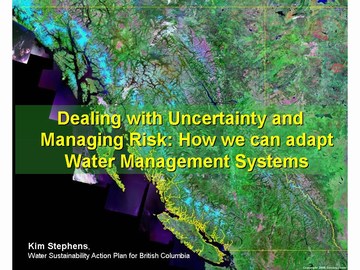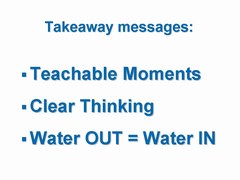Dealing with Uncertainty and Managing Risk: How we can adapt Water Management Systems

Climate Change Workshop
In November 2007, the Fraser Basin Council hosted a workshop in Vancouver on adaptive decision-making, water management and climate change. The workshop explored links between climate change adaptation strategies and decision-making processes in the Fraser Basin.
The workshop featured a panel session comprising four speakers representing diverse fields of thought. The panel included Kim Stephens, Program Coordinator for the Water Sustainability Action Plan for British Columbia. He provided a water resource practitioner’s perspective.
To Learn More:
To learn more about the workshop, follow this link to Preparing for Climate Change in the Fraser Basin: How Can our Water Management Systems Adapt? which is posted on the Water-Centric Planning community-of-interest.
Climate Change is a Variable
Kim Stephens opened his presentation by stating that the real issues are uncertainty and risk, more specifically how we deal with the first and manage the latter. According to Stephens, “Climate change is not the driver; rather, it is a variable. Furthermore, climate change is only one factor to consider when we talk about sustainable infrastructure .
 “The key is to focus on what you want to do. Because many factors are in play, the objective is to build in resiliency to address risk,” stated Stephens, “As Ted van der Gulik, Chair of the Water Balance Model Partnership points out, we have to know where we want to go. Then we can figure out the steps to get there. To adapt water supply systems, the question boils down to: how much water do we need, and how can we make efficient use of what is available?
“The key is to focus on what you want to do. Because many factors are in play, the objective is to build in resiliency to address risk,” stated Stephens, “As Ted van der Gulik, Chair of the Water Balance Model Partnership points out, we have to know where we want to go. Then we can figure out the steps to get there. To adapt water supply systems, the question boils down to: how much water do we need, and how can we make efficient use of what is available?
Sound-Bites to Keep in Mind
This slide provided the road map for the presentation by Kim Stephens . “These three bullets reflect the essence of what I have observed in my 30-plus year career,” Stephens told his audience.
 According to Stephens, “The average person may presume that the water management knowledge foundation is solid, thereby providing a platform to do better. But if there is a structural problem with the basic thinking of those who actually make the planning decisions, then a likely outcome is: Houston, we have a problem. I have seen too many of those situations.
According to Stephens, “The average person may presume that the water management knowledge foundation is solid, thereby providing a platform to do better. But if there is a structural problem with the basic thinking of those who actually make the planning decisions, then a likely outcome is: Houston, we have a problem. I have seen too many of those situations.
Downloadable Document:
To read the complete story about the presentation by Kim Stephens, click on Dealing with Uncertainty and Managing Risk: How we can adapt Water Management Systems.
This 5-page document is a convenient way to become informed about the Water OUT =Water IN approach developed by the Water Sustainability Committee in 2005.
Original story posted on the Water-Centric Planning Community-of-Interest

